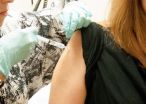New research supporting stroke rehabilitation
2014-11-27
(Press-News.org) Using world-leading research methods, the team of Dr David Wright and Prof Paul Holmes, working with Dr Jacqueline Williams from the Victoria University in Melbourne, studied activity in an area of the brain responsible for controlling movements when healthy participants observed a video showing simple hand movements and simultaneously imagined that they were performing the observed movement.
Using transcranial magnetic stimulation - a technique where a coil placed over the scalp delivers a stimulation to the brain, activates neurons in the underlying area, and causes a muscular contraction in the participant's hand - the researchers found that combining imagery (imagining the feelings associated with performing the movement) with observation (watching the movement) created the strongest activity in the brain.
Using electrodes on the participant's hand, the researchers found that muscle contractions in response to the cortical stimulation were larger when participants were concurrently imagining themselves moving their muscle whilst watching a video of a hand moving on screen, compared to when they used the imagery or observation techniques alone. or engaged in various control conditions.
This research, which is published in the open-access journal Frontiers in Human Neuroscience, may provide useful applications for the care of stroke patients who have restricted use of their upper limbs. If stroke patients practice the recommended techniques, it could potentially help maintain activity in movement-related brain areas, especially when used alongside more traditional physiotherapy techniques where the same movements are also practiced physically.
Dr Wright said: "The idea is that because imagery and observation techniques share some characteristics with physical movement in terms of activating similar areas of the brain, if someone can't perform the movements themselves physically, it might be possible to keep those areas of the brain active through imagery and observation techniques. This might help contribute to the recovery of motor function."
Currently, imagery and, less frequently, observation are used separately alongside physical therapy during the rehabilitation of stroke patients, but Prof Holmes suggested that combining the two techniques may support re-learning of movement patterns for some patients.
He said: "After a stroke, parts of the brain die and will not recover. To compensate, other parts of brain can alter their function to take control of the lost behaviour - a form of brain plasticity. We think that combining imagery and observation, in addition to physical therapy, may allow the brain to speed up this plastic change as well as benefitting more psychological aspects of recovery such as movement confidence". He continued, "the research team's work in this area has the potential to make a real impact on the way physiotherapists, occupational therapists and nurses work with the stroke community"
"These changes may happen without the intervention - it is certainly not a miracle cure - but the combined imagery and action observation approach should speed up the process of relearning movements that have been lost."
The research was funded by Manchester Metropolitan University's Knowledge Exchange Innovation Fund and a Research Accelerator Grant awarded to Dr Wright (an early career researcher in the Motor Cognition Research section of the Centre of Health, Exercise and Active Living).
Future research by the Group will seek to establish optimal methods for delivering these psychological interventions for stroke rehabilitation by investigating the effects of different types of instruction given to participants and different video presentation methods on activity in the brain during combined imagery and observation. The team also expect to release a stroke rehabilitation App in early 2015.
INFORMATION:
Notes to editors
1. For further information, or to speak to the researchers, contact Kat Dibbits in the MMU press office on 0161 247 5278 or email K.Dibbits@mmu.ac.uk
2. For online articles, please include a link to the article, which will appear on the following active URL: http://journal.frontiersin.org/Journal/10.3389/fnhum.2014.00951/full
Article title: Combined action observation and imagery facilitates corticospinal excitability
Journal: Frontiers in Human Neuroscience
DOI: doi: 10.3389/fnhum.2014.00951
Authors: David J. Wright, Jacqueline Williams and Paul S. Holmes
3. About Manchester Metropolitan University
Manchester Metropolitan University is a leading university for the professions and a powerful driver of the North West economy.
The University educates and trains large numbers of the region's legal and business professionals, scientists, engineers, teachers, health workers and creative professionals. It enjoys an excellent reputation for teaching and applied research and is a recognised innovator in partnership working with its local communities. The University is currently investing almost £300 million in its estate and facilities.
4. About Frontiers
Frontiers is a community-driven open-access publisher and research networking platform. Established by scientists in 2007, Frontiers drives innovations in peer-review, article level metrics, post publication review, democratic evaluation, research networking and a growing ecosystem of open-science tools. The "Frontiers in" journal series has published 25,000 peer-reviewed articles across 49 journals, which receive 6 million monthly views, and are supported by over 160,000 leading researchers worldwide. In 2014, Frontiers won the ALPSP Innovation in Publishing Award. For more information, visit: http://www.frontiersin.org
ELSE PRESS RELEASES FROM THIS DATE:
2014-11-27
TORONTO, Nov. 26, 2014 - Ontario students between Grades 9 and 12 who said they had a traumatic brain injury in their lifetime, also reported drug use rates two to four times higher than peers with no history of TBI, according to research published today in The Journal of Head Trauma Rehabilitation.
"Overall, a teen with a history of TBI is at least twice as likely as a classmate who hasn't suffered a brain injury to drink alcohol, use cannabis or abuse other drugs," said Dr. Michael Cusimano, co-principal investigator of the study and a neurosurgeon at St. Michael's ...
2014-11-27
This news release is available in French.
The world's first clinical trial comparing three alternative treatments for type 1 diabetes was conducted in Montréal by researchers at the IRCM and the University of Montreal, led by endocrinologist Dr. Rémi Rabasa-Lhoret. The study confirms that the external artificial pancreas improves glucose control and reduces the risk of hypoglycemia compared to conventional diabetes treatment. The results, published today in the scientific journal The Lancet Diabetes & Endocrinology, could have a significant impact on the ...
2014-11-27
Leading medical experts today [Thursday 27 November] warn that rising numbers of deaths from liver disease - already the UK's third commonest cause of premature death - will be unavoidable without radical improvements in treatment and detection services, and tougher government policies to control the excessive alcohol use and obesity responsible for much of the national burden of liver disease.
In a major new Lancet Commission, led by Professor Roger Williams, Director of the Institute of Hepatology, London, UK, doctors and medical scientists from across the UK call ...
2014-11-27
Boston, MA. Wednesday, November 26, 2014 -- Researchers from the Broad Institute of MIT and Harvard, Harvard Medical School, and Harvard-affiliated hospitals have uncovered an easily detectable, "pre-malignant" state in the blood that significantly increases the likelihood that an individual will go on to develop blood cancers such as leukemia, lymphoma, or myelodysplastic syndrome. The discovery, which was made independently by two research teams affiliated with the Broad and partner institutions, opens new avenues for research aimed at early detection and prevention of ...
2014-11-27
TORONTO, Nov. 26, 2014--The nervous system may play a bigger role in infections and autoimmune diseases than previously known. If researchers can learn more about that role, it could provide insight into diagnosing and treating everything from the stomach flu to rheumatoid arthritis.
Researchers at St. Michael's Hospital in Toronto, in conjunction with the Feinstein Institute for Medical Research in Manhasset, N.Y., reviewed the latest, most vigorous pre-clinical trials on this topic in a commentary published Wednesday (Nov. 26) in the New England Journal of Medicine. ...
2014-11-27
An experimental vaccine to prevent Ebola virus disease was well-tolerated and produced immune system responses in all 20 healthy adults who received it in a Phase 1 clinical trial conducted by researchers from the National Institutes of Health. The candidate vaccine, which was co-developed by the NIH's National Institute of Allergy and Infectious Diseases (NIAID) and GlaxoSmithKline (GSK), was tested at the NIH Clinical Center in Bethesda, Maryland. The interim results are reported online in advance of print in the New England Journal of Medicine.
"The unprecedented scale ...
2014-11-26
ANN ARBOR--The spaghetti-like internal structure of most plastics makes it hard for them to cast away heat, but a University of Michigan research team has made a plastic blend that does so 10 times better than its conventional counterparts.
Plastics are inexpensive, lightweight and flexible, but because they restrict the flow of heat, their use is limited in technologies like computers, smartphones, cars or airplanes--places that could benefit from their properties but where heat dissipation is important. The new U-M work could lead to light, versatile, metal-replacement ...
2014-11-26
MINNEAPOLIS - The majority of people with dementia have never seen a doctor about their memory and thinking problems, according to a new study published in the November 26, 2014, online issue of Neurology®, the medical journal of the American Academy of Neurology.
In the study, 55 percent of the people with dementia had never had an evaluation of their thinking and memory skills with a doctor.
"These results suggest that approximately 1.8 million Americans over the age of 70 with dementia have never had an evaluation of their cognitive abilities," said study author ...
2014-11-26
ANN ARBOR, Mich. -- Despite clear signs that their memory and thinking abilities have gone downhill, more than half of seniors with these symptoms haven't seen a doctor about them, a new study finds.
University of Michigan researchers and their colleagues say their findings suggest that as many as 1.8 million Americans over the age of 70 with dementia are not evaluated for cognitive symptoms by a medical provider, which in some patients can lead to a failure to uncover modifiable causes of thinking or memory impairment.
The study, published online in Neurology, the ...
2014-11-26
Juvenile offenders with multiple psychiatric disorders when they are incarcerated in detention centers appear to be at high risk for disorders five years after detention, according to a report published online by JAMA Psychiatry.
Psychiatric disorders are prevalent among juvenile detainees. However, far less is known about the young people after they leave detention.
Karen M. Abram, Ph.D., of the Northwestern University Feinberg School of Medicine, Chicago, and co-authors looked at patterns of comorbidity (the presence of two or more disorders), how they change over ...
LAST 30 PRESS RELEASES:
[Press-News.org] New research supporting stroke rehabilitation


